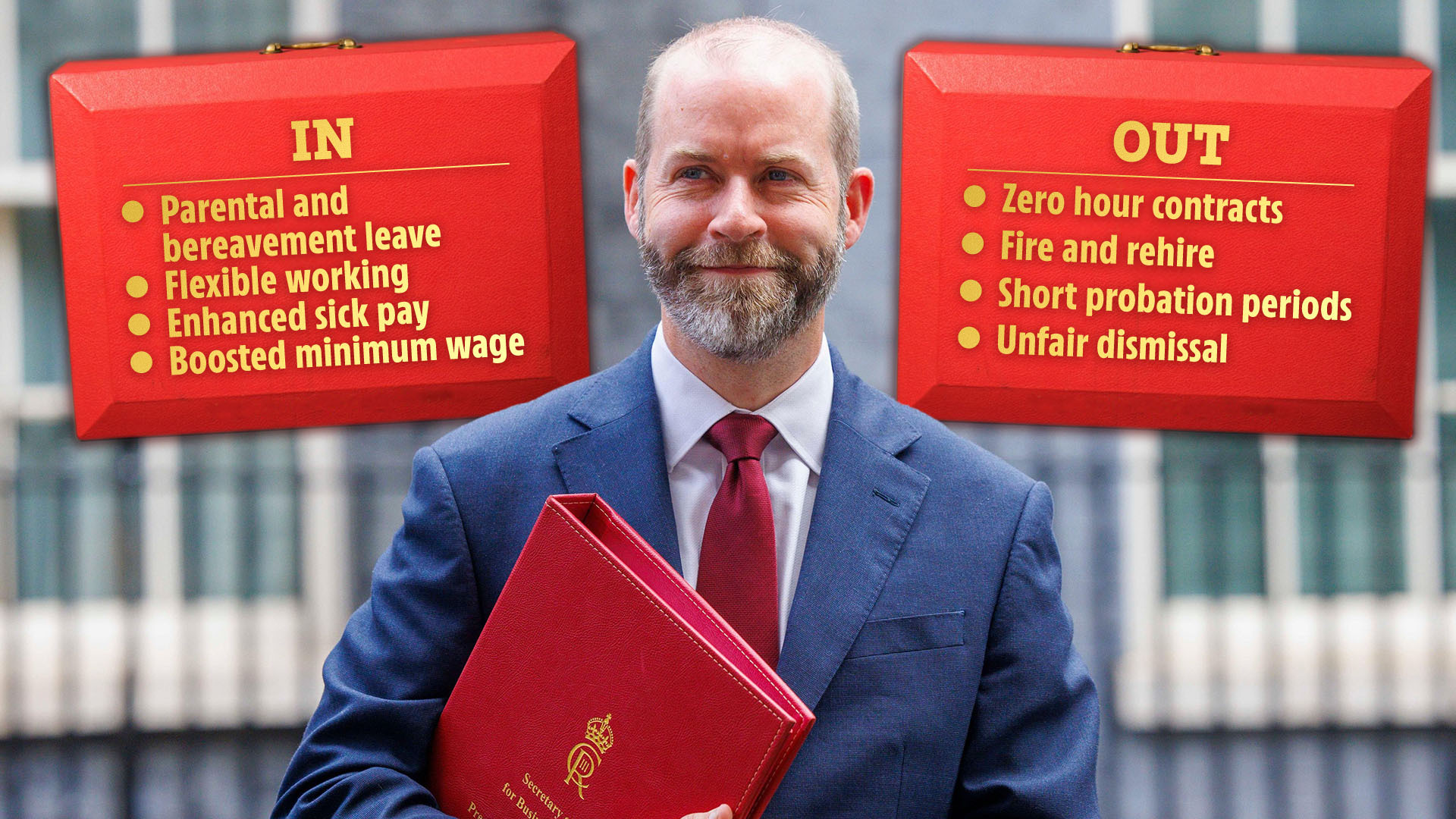Money
Exact date Winter Fuel Payment letters will land on doormats – will you get £300 bill boost?

THOUSANDS of households will soon receive letters confirming their entitlement to a £300 cash boost.
The Winter Fuel Payment is a state benefit paid once a year to pensioners to help cover the costs of heating during the colder months.
It was avaible to everyone aged 66 and over but recent cuts made by Chancellor Rachel Reeve mean only those on means-tested benefits, such as Pension Credit, will now get the help.
How much you recieve also depends on what year you were born.
For example, if you live alone you will get £200 if you were born between September 23 1944 and September 22 1958.
But you will get £300 if you live alone and were born before 23 September 1944.
If you and your partner jointly claim any of the benefits, one of you will get a payment of either:
- £200 if one or both of you were born between September 23 1944 and September 22 1958
- £300 if one or both of you were born before September 23 1944
The Department for Work and Pensions (DWP) will begin sending letters to pensioners who quailfy for the payment in England, Wales and Northern Ireland. by the end of October.
For customers in Scotland the target date for issuing the letters will be in November.
All quailfying pensioners across the UK should recieve their payment of either £200 or £300 by November or December.
The money is paid automatically in your bank account.
If you do not get a letter or the money has not been paid into your account by January 29 2025 it is recomennded you get in contact with the Winter Fuel Payment Centre.
This is operated by the DWP and can reached on the telephone by calling 0800 731 0160.
You can also send a letter via the psot to Winter Fuel Payment Centre. Mail Handling Site A, Wolverhampton, WV98 1LR.
When you contact the payment centre, you’ll need to tell them your personal details like:
- Your name
- Your address
- Your date of birth
- Your National Insurance number
Who is eligble for the Winter Fuel Payment
You will receive the Winter Fuel Payment if you are aged 66 or above and on any of the following benefits.
- Pension Credit
- Universal Credit
- income-related Employment and Support Allowance (ESA)
- income-based Jobseeker’s Allowance (JSA)
- Income Support
- Child Tax Credit
- Working Tax Credit
You may also recieve the benefit if you are a UK pensioner who lives abroad.
A partner below the state pension age may also be eligible for the £300 payment if they live with a partner who is over state pension age and they jointly claim benefits.
It is worth noting that around 800,000 older people risk missing out on the £300 Winter Fuel Payment because they have not first registered for Pension Credit.
The benefit is a weekly payment from the government to those over the state pension age who have an income below a certain level.
If your claim is successful then the benefit will top up your income to £218.15 a week if you are single, or £11,343.80 a year.
It will also give you access to the Winter Fuel Payment.
You will need to have been claiming Pension Credit in the ‘qualifying week’ of September 16 to 22, 2024.
But claims can be backdated by three months meaning you have until December 21 to make a claim and still get the Winter Fuel Payment.
If you want to check your eligibility then it is worth checking out our article here.
You can also find free-to-use online benefits calculators to work out what you’re entitled to.
For example, Age UK has an online calculator which helps you work out what benefits you could be entitled to including the Winter Fuel Payment and Pension Credit.
According to the site it takes 10 minutes to complete and you will need the following information:
- Your savings
- Your income, including your partner’s if you have one
- Any benefits or pensions you’re already claiming, including anyone you’re living with.
The calculator is free to use and confidential.
Crucial to claim Pension Credit if you can
HUNDREDS of thousands of pensioners are missing out on Pension Credit.
The Sun’s Assistant Consumer Editor Lana Clements explains why it’s imperative to apply for the benefit..
Pension Credit is designed to top up the income of the UK’s poorest pensioners.
In itself the payment is a vital lifeline for older people with little income.
It will take weekly income up to to £218.15 if you’re single or joint income to £332.95.
Yet, an estimated 800,000 don’t claim this support. Not only are they missing on this cash, but far more extra support that is unlocked when claiming Pension Credit.
With the winter fuel payment – worth up to £300 now being restricted to pensioners claiming Pension Credit – it’s more important than ever to claim the benefit if you can.
Pension Credit also opens up help with housing costs, council tax or heating bills and even a free TV licence if you are 75 or older.
All this extra support can make a huge difference to the quality of life for a struggling pensioner.
It’s not difficult to apply for Pension Credit, you can do it up to four months before you reach state pension age through the government website or by calling 0800 99 1234.
You’ll just need your National Insurance number, as well as information about income, savings and investments.
Money
Eight big changes to workers rights including maternity and sick pay – what the shake up means for you

MILLIONS of workers are set to receive enhanced sick pay, maternity benefits, and stronger job protections under new Labour proposals.
The Employment Rights Bill, unveiled this morning, will grant sick pay from the very first day of illness.
Pregnant women and new mothers will also benefit from stronger protections when returning to work.
Zero hour contracts and fire and rehire practices, long deemed exploitative, are also set to be abolished.
Business Secretary Jonathan Reynolds said the Employment Rights Bill will elevate the baseline of employment rights and improve living standards nationwide.
In a statement this morning, he said: “This is a pro-worker, pro-business plan.
“The government will tackle head-on the issues within the UK labour market that are holding Britain back.
“The Plan to Make Work Pay sets out a vision for modern and fair employment protections that will set the country up for the future.”
Details of many policies in the Bill will now go through a consultation process.
The government added that it expects the new rules to come into force in 2026.
For now, we’ve outlined exactly what’s on the table and what it means for you.
Parental and bereavement leave
Currently, only individuals legally classified as employees are eligible for paternity leave.
To qualify, one must have been continuously employed by their employer for at least 26 weeks leading up to any day in the “qualifying week,” the 15th week before the baby’s due date.
This means those classified as workers are not entitled to paternity leave and must use their annual leave to take time off.
The Employment Rights Bill aims to change this by introducing day-one entitlement to paternity leave and unpaid parental leave.
It will also improve maternity protections for expecting and new mothers.
This includes protection from dismissal whilst pregnant, on maternity leave and within six months of returning to work.
Plus, the Bill will also establish a statutory entitlement to bereavement leave.
At the moment, there is no legal right to paid time off for bereavement in the UK, but employers can offer it voluntarily.
Flexible working
Flexible working is a way of working that suits an employee’s needs, for example having flexible start and finish times, or working from home.
Currently, all employees have the legal right to request flexible working.
An employer can refuse an application if they have a good business reason for doing so.
However, the Employment Rights Bill will give employees the right to flexible working as default.
The move is said to increase the likelihood of a request for flexible working arrangements to be granted.
However, if an employer can prove this work pattern is “unreasonable” they might still be able to deny it.
At the moment, it’s not clear how these reasons will be interpreted.
Sick pay
Under current statutory sick pay rules, only those earning an average of over £123 a week are eligible.
Those who qualify receive £116.75 per week if they are too ill to work.
Your employer pays this amount for up to 28 weeks, with payments starting after the first three days of leave.
However, the Employment Rights Bill proposes eliminating the earnings threshold to qualify.
It will also ditch the three-day waiting period before workers begin receiving payments.
THE SUN SAYS
LABOUR’S new workers’ rights reforms are focused on the wrong thing…
Euan Blair made a fortune and created hundreds of jobs by ingeniously exploiting one of his own dad Tony’s biggest mistakes. His insight is worth reading.
He seemingly realised the ex-PM’s zeal to get half our school pupils to university was folly.
Because even a top-flight degree doesn’t guarantee them a job, let alone a lucrative and fulfilling career.
Euan’s hugely successful start-up matches young talents with apprenticeships at big employers without the need for three expensive and sometimes pointless years at uni.
And when he now says Labour’s new workers’ rights reforms are focused on the wrong thing, he’s hit the nail on the head again.
Angela Rayner may think it’s vital to let more people work from home, do a four-day week or ban the boss from calling after 6pm.
None of that will matter a jot if the tsunami of AI sweeps away their job and millions more.
This Government, Euan says, is in danger of “fixing the problems of yesterday” while losing sight of tomorrow’s.
The future, he says, rests on reskilling workers for the looming tech revolution.
You can read about it here. We hope they do so in No10 too — and take notice.
Unfair dismissal
Dismissal is when your employer ends your employment – they do not always have to give you notice.
If you have been with the company for at least two years, you have the right to receive a written explanation, which should be in the form of a letter or email.
The law states that it is always unfair if you are dismissed for an “automatically unfair” reason.
You can also challenge your employer if they dismiss you for a discriminatory reason.
If you were dismissed for a different reason and have worked for your employer for less than two years, you do not have the right to challenge it.
However, the Employment Rights Bill promises day one protection from unfair dismissal.
According to officials, around nine million workers who have been with their employer for less than two years will benefit from this change.
Probation periods
A probation period is a designated timeframe at the start of an individual’s employment, during which they can be dismissed with little or no notice if deemed unsuitable for the role.
Currently, there are no specific rules on the duration of these periods, which typically range from three to six months in the UK.
However, the Employment Rights Bill proposes introducing a statutory probation period for new hires, with the government consulting on a nine-month duration.
The government asserts that this will allow for a thorough assessment of an employee’s suitability for a role while reassuring employees that they have rights from day one.
It suggests this initiative will enable businesses to take chances on new hires and give more people the confidence to re-enter the job market or change careers, ultimately improving their living standards.
Zero hour contracts
A zero hour contract, also known as a casual contract, is an employment agreement where the employer does not guarantee a minimum number of working hours for the employee.
At the same time, the employee is not obliged to accept any work offered.
The Employment Rights Bill promises to ditch zero hour contracts in their current form.
This legislation will provide casual workers the right to a guaranteed hours contract if they have worked regular hours over a defined period, thereby offering greater earnings security.
However, the government has confirmed that individuals who prefer to remain on zero hour contracts will still have the option to do so.
Fire and rehire
Fire and rehire, also known as dismissal and re-engagement, is a practice where an employer sacks employees and rehires them on different, often less favourable, terms and conditions.
This approach is typically employed when employers seek to implement changes to employment contracts that employees might not voluntarily accept.
Currently, fire and rehire is not outright illegal in the UK.
However, the Employment Rights Bill will ban the practice in all but extreme circumstances.
Minimum wage
Currently, there are two different minimum wage rates that all workers across the UK are entitled to: the National Minimum Wage and the National Living Wage.
The National Minimum Wage (NMW) is the minimum pay per hour for workers who have left school.
Right now, 18 to 20-year-olds must earn at least £8.60 an hour.
Meanwhile, the National Living Wage is the minimum wage for those over 21, and is slightly higher.
It was previously only available to those over 23, but this was adjusted to 21 and over in November 2023.
It’s currently worth £11.44 an hour.
Young workers aged 18 to 20 are expected to see a substantial increase in their statutory rate as the Employment Rights Bill will direct the Low Pay Commission to remove all age bands that set lower minimum wages for younger staff.
When was the minimum wage introduced?
THE first National Minimum Wage was put in place in 1998 by the Labour government.
It originally applied to workers aged 22 and over, and there was a separate rate for those aged 18-21.
A separate rate for 16-17-year-olds was introduced in 2004, and in 2010, 21-year-olds became eligible for the adult rate of the National Minimum Wage.
The rate is set by the Government each year based on recommendations by the Low Pay Commission (LPC).
Money
Brookfield trumps SEGRO with £557m agreed takeover of Tritax Eurobox

The offer represents a 28% premium over the market price of Tritax EuroBox shares at the end of May.
The post Brookfield trumps SEGRO with £557m agreed takeover of Tritax Eurobox appeared first on Property Week.
Money
Nando’s launches never-seen-before spice flavour based on a famous fizzy drink

NANDO’S has just unleashed a never-before-seen spice flavour, inspired by a popular fizzy drink.
The chicken chain is set to launch a new spice combining their PERi-PERi with Fanta Orange Zero Sugar.
Launching in time for spooky season, the Nando’s x Fanta collab sits on the PERi-ometer between Mild and Medium.
This is the first new spice flavour Nando’s has launched in two years.
The zesty, fruity flavour comes with just a hint of chilli, perfect for anyone who loves a fizzy kick with their wings.
The new menu, including the Fanta spice, lands in restaurants on Tuesday, October 15 and will be available at all locations across the UK and Ireland.
You can find your nearest restaurant using the locator tool on the chain’s website.
The unique flavour will be on the menu until spring so fans have a while to give it a go.
This flavour sensation is the centrepiece of Nando’s Halloween menu.
The chain is also launching a series of in-restaurant parties, giveaways, and experiences to embrace the spooky vibes.
NEW MENU TREATS
The Fanta spice is not the only addition hitting chains this Halloween.
Nando’s is also introducing several brand-new menu items.
For starters, there’s the Cheesy Garlic Pitta, inspired by a staff hack.
It features a toasted sourdough pitta, loaded with melted cheddar cheese, garlic, spring onions, and a touch of PERi-PERi.
Next up is the Cheesy Chickle Burger, which includes a grilled chicken breast, smothered in melted cheddar cheese, PERi-Ketchup, and Garlic PERinaise.
It’s topped with crisp lettuce and herby pickles, all packed into a soft Portuguese roll.
For sharing (or not), Nando’s is rolling out the All-in Platter for Two, while a new dip, the Churrasco PERinaise, brings even more heat to the table.
New Menu items
Here’s a list of all the menu items set to hit Nando’s this spooky season:
Nando’s x Fanta Spice – A sweet and tangy orange flavour with a hint of PERi-PERi, available on the PERi-ometer between Mild and Medium.
5 Nando’s x Fanta Wings – Chicken wings flavoured with the new Nando’s x Fanta spice.
Priced at £7.25/ £12.95 two regular sides
Cheesy Garlic Pitta – A toasted sourdough pitta stuffed with melted cheddar cheese, garlic, spring onions, and a hint of PERi-PERi, served with red pepper chutney.
Priced at £4.75.
Cheesy Chickle Burger – Grilled chicken breast with melted cheddar cheese, PERi-Ketchup, Garlic PERinaise, lettuce, and herby pickles in a soft Portuguese roll.
Priced at £9.25 on its own/ £14.95 for two regular sides
All-in Platter for Two – A new sharing platter with a selection of Nando’s favourites.
Priced at £33.75
Churrasco PERinaise Dip Pot – A new dip combining PERinaise with Churrasco sauce for extra flavour.
Priced at £1
Nando’s isn’t the only place spicing things up this spooky season.
The Sun can reveal that McDonalds will also be launching a new menu in time for Halloween.
The fast food giant will be adding three new items next week as well as upgrading a breakfast favourite and its popular Hash browns.
Meanwhile, it’s no surprise Brits love a cheeky Nando’s, but one man loves it so much he flew 690 miles for less than three hours just to get his Nando’s fix.
Elsewhere, fans have hit out at the chicken chain over a cheeky price hike after prices shot up by a third in three years, yet portions only seem to be shrinking.
How to save money on your takeaway
TAKEAWAYS taste great but they can hit you hard on your wallet. Here are some tips on how to save on your delivery:
Cashback websites– TopCashback and Quidco will pay you to order your takeaway through them. They’re paid by retailers for every click that comes to their website from the cashback site, which eventually trickles down to you. So you’ll get cashback on orders placed through them.
Discount codes – Check sites like VoucherCodes for any discount codes you can use to get money off your order.
Buy it from the shops – Okay, it might not taste exactly the same but you’ll save the most money by picking up your favourite dish from your local supermarket.
Student discounts – If you’re in full-time education or a member of the National Students Union then you may be able to get a discount of up to 15 per cent off the bill. It’s always worth asking before you place your order.
Money
Dalata Hotel Group completes €600m refinancing

The new lending facilities are made up of a green term loan facility of €100m and a multi-currency revolving credit facility of €375m with opening margin of 1.70% and 1.30% respectively.
The post Dalata Hotel Group completes €600m refinancing appeared first on Property Week.
Money
Why active management is really over


The changing nature of the asset management industry is a wonder to behold.
When I first started out, the main recommendation for investment was a managed bond. Partly because so many adviser firms were being set up by those who had worked in the insurance industry selling life bonds and also because they would pay 5%-plus commission.
At that time, unit trusts paid 3%. It wasn’t hard to see what was going to be sold the most.
The 5% withdrawal, often described as tax free, was another selling point. Do you remember the income surcharge investors had to pay for their dividends, too, again helping the sales of insurance bonds? And, of course, no regulation to begin with. What a cowboy’s charter.
It’s good to see how much has changed – mostly for the better. The Retail Distribution Review was a big change and Consumer Duty has signalled a turning point for old poor practices, too.
Meanwhile, the active management industry is now under the most pressure I have ever seen.
Active is caught between high costs of regulation and new business rapidly disappearing to the passive industry.
Looking at the top 20 best-selling funds from major platforms today, compared to only about five years ago, I am struck by just how many are passive funds – generally the majority.
Have investors suddenly discovered that these funds are much cheaper than active? Perhaps that is some of the story, but the biggest reason is surely that old chestnut – past performance.
Simply put, passive funds have slaughtered most active funds, especially over the last 15 years or so.
This wasn’t always the case. I remember at Hargreaves Lansdown looking at passive funds in the noughties and finding most were, at best, third quartile performers.
What changed? Falling prices, the rise of ETFs and the move to global funds rather than regional funds (although the latter is, of course, still well represented by passives) have all played a part.
Before the turn of the century, global funds hadn’t been big sellers. Portfolio managers usually preferred to do their own asset allocation through regional funds. The DIY investor was also more attracted to specific funds and the media tended to centre on regional funds where there was usually more of a story to write. Global seemed more of a backwater.
But there has been another factor at play. In some ways, we got an inkling of this in the late 1990s with the tech boom and bust, which really centred on the US.
From this first boom came many of the big US winners we see today. The top US stocks now not only dominate the S&P but the global indices, too, and the US weighting in the global index is now over 70%.
With such large index companies, it becomes very difficult for active managers to have any chance of outperforming.
The US has been the standout major market since the low point of the great recession in 2009. As it dominates global indices, is it surprising global index funds have become so popular? They are, in effect, quasi-US funds.
As such, the diversification argument for buying a global fund seems quite weak and may well come back to bite investors later. It is equally possible to argue that, should the US market catch a cold, the other markets will have pneumonia.
So, today, the investment world is dominated by two factors – passives and the US.
I vaguely seem to recall Sir John Templeton saying that, once a sure way of making money had been found in markets, it was only a matter of time before some kind of disaster struck.
Will the momentum style of passive investing be its downfall? Maybe. But at least no one will get the blame, as it can only reflect the market.
Will active rise to the challenge? No chance. It’s too fraught with regulatory and business risk to do anything much different to the index and, of course, we all know you can be wrong for a long time.
I suspect the party will continue for a bit longer. Plenty of cash remains on the sidelines and pessimism still abounds. For a sense of danger, I also think too many look to the US. China looks to be the most in trouble – but that’s for another time.
In the meantime, I expect to see huge consolidation in the active management industry.
Mark Dampier is an independent consultant and can be found tweeting at @MarkDampier
Money
I won £25million lottery jackpot but only took home a fraction because of promise I made years ago

A HOSPITAL COOK won £25 million in the lottery, but only took home a fraction of the winnings due to a promise she’d made years previously.
Julie Amphlett was working at Nealth Port Talbot Hospital, Wales when she heard the news of her giant EuroMillions win in 2017.
However, she had previously agreed to divide any winnings with five other people – meaning she only came away with just over £4.2 million.
The six women were part of a work syndicate called The Catering Girls – all colleagues at the hospital.
They had been playing the Euromillions for six years before their win.
Despite losing out on a large proportion of the jackpot, syndicate leader Julie was delighted with the result, as the six colleagues all quit their jobs and jetted off on a luxury holiday to Las Vegas.
Julie and fellow syndicate members Louise Ward and Sian Thomas reunited this week to celebrate 30 years of the National Lottery.
Along with other lottery winners, the women prepared a special lunch for guests at the Cegin Hedyn community café.
Julie said: “It’s great to be back in the kitchen with the girls, it takes us right back to those years we spent in the hospital kitchen before our incredible win.
“And it’s nice to be using our skills for such a deserving project.
“The idea that everyone, from all walks of life, can come together and share a meal is so important within the local community.”
The women prepared food and mocktails, and presented a gift and thank you note to those involved in the success of the café.
Since opening, Cegin Hedyn has served over 10,000 meals to the local community.
Dave and Sarah Williams, Wales’ most recent National Lottery millionaires, also joined The Catering Girls in the kitchen.
Dave said: “Since that incredible moment when our numbers came up I’ve pinched myself quite a bit, and today is no different.
“Firstly, it’s amazing to meet all these other lucky winners – I didn’t realise there were so many in Wales! – and it’s also been great to see where the Good Cause funding goes to, this project is doing some truly amazing things for the community in Carmarthen.
“Our lives have changed so much for the better since our winning moment.
“We moved into a new home where Trevor, our very boisterous dog, can finally wear himself out with his zoomies, and Sarah and I are taking things easy for a bit before we plan our next adventures, and if I know Sarah, that might well be deciding what pet will be joining our family next.”
The news comes as another lottery syndicate in Australia descended into a bitter feud.
Alan Way sought legal action against Mark Peter Bowling, 76, and Moya Posa, 89, over claims he was cut out of the syndicate’s massive £3 million winnings.
What is a lottery syndicate
A lottery syndicate is a group of lottery players who pool their resources to buy multiple tickets, increasing their chances of winning. The costs and winnings are shared among all members. Syndicates can be formed online or with friends, family, or colleagues.
Setting up a syndicate
- Set up a syndicate agreement to avoid disputes and tax issues. This will outline the structure and management of the syndicate.
- Appoint a syndicate manager
What are the syndicate manager’s responsibilities?
- Maintain the syndicate agreement
- Ensure each player has paid for their tickets
- Purchase tickets and check for prizes
- Collect and distribute winnings among members
How many members can you have and how many tickets can you buy?
- There’s no limit to the number of members or tickets
- More tickets increase winning chances, but also make management harder and winnings smaller per member
Prize distribution
- Winnings are paid to the syndicate manager, who then distributes them
- Online syndicates automate this process
Legality
- Lottery syndicates are legal and a fun way to enhance your chances of winning
- Ensure a syndicate agreement is in place for offline groups, or join an online group for secure and automated management of tickets and winnings
-

 Science & Environment3 weeks ago
Science & Environment3 weeks agoHyperelastic gel is one of the stretchiest materials known to science
-

 Science & Environment3 weeks ago
Science & Environment3 weeks agoHow to unsnarl a tangle of threads, according to physics
-

 Womens Workouts2 weeks ago
Womens Workouts2 weeks ago3 Day Full Body Women’s Dumbbell Only Workout
-

 Technology3 weeks ago
Technology3 weeks agoWould-be reality TV contestants ‘not looking real’
-

 Science & Environment3 weeks ago
Science & Environment3 weeks agoMaxwell’s demon charges quantum batteries inside of a quantum computer
-

 Science & Environment3 weeks ago
Science & Environment3 weeks ago‘Running of the bulls’ festival crowds move like charged particles
-
News3 weeks ago
the pick of new debut fiction
-

 Science & Environment3 weeks ago
Science & Environment3 weeks agoITER: Is the world’s biggest fusion experiment dead after new delay to 2035?
-

 Science & Environment3 weeks ago
Science & Environment3 weeks agoHow to wrap your mind around the real multiverse
-

 Science & Environment3 weeks ago
Science & Environment3 weeks agoSunlight-trapping device can generate temperatures over 1000°C
-

 News3 weeks ago
News3 weeks agoOur millionaire neighbour blocks us from using public footpath & screams at us in street.. it’s like living in a WARZONE – WordupNews
-

 Science & Environment3 weeks ago
Science & Environment3 weeks agoQuantum forces used to automatically assemble tiny device
-

 Science & Environment3 weeks ago
Science & Environment3 weeks agoQuantum ‘supersolid’ matter stirred using magnets
-

 Science & Environment3 weeks ago
Science & Environment3 weeks agoLiquid crystals could improve quantum communication devices
-

 Science & Environment3 weeks ago
Science & Environment3 weeks agoPhysicists are grappling with their own reproducibility crisis
-

 Science & Environment3 weeks ago
Science & Environment3 weeks agoTime travel sci-fi novel is a rip-roaringly good thought experiment
-

 Science & Environment3 weeks ago
Science & Environment3 weeks agoLaser helps turn an electron into a coil of mass and charge
-

 Science & Environment3 weeks ago
Science & Environment3 weeks agoWhy this is a golden age for life to thrive across the universe
-

 Science & Environment3 weeks ago
Science & Environment3 weeks agoNuclear fusion experiment overcomes two key operating hurdles
-
Business2 weeks ago
Eurosceptic Andrej Babiš eyes return to power in Czech Republic
-

 News4 weeks ago
News4 weeks ago▶️ Hamas in the West Bank: Rising Support and Deadly Attacks You Might Not Know About
-

 Science & Environment3 weeks ago
Science & Environment3 weeks agoCaroline Ellison aims to duck prison sentence for role in FTX collapse
-

 News3 weeks ago
News3 weeks agoYou’re a Hypocrite, And So Am I
-

 Sport3 weeks ago
Sport3 weeks agoJoshua vs Dubois: Chris Eubank Jr says ‘AJ’ could beat Tyson Fury and any other heavyweight in the world
-

 Science & Environment2 weeks ago
Science & Environment2 weeks agoX-rays reveal half-billion-year-old insect ancestor
-

 Science & Environment3 weeks ago
Science & Environment3 weeks agoNerve fibres in the brain could generate quantum entanglement
-

 News3 weeks ago
News3 weeks ago▶️ Media Bias: How They Spin Attack on Hezbollah and Ignore the Reality
-

 Technology2 weeks ago
Technology2 weeks ago‘From a toaster to a server’: UK startup promises 5x ‘speed up without changing a line of code’ as it plans to take on Nvidia, AMD in the generative AI battlefield
-

 Football2 weeks ago
Football2 weeks agoFootball Focus: Martin Keown on Liverpool’s Alisson Becker
-

 News3 weeks ago
News3 weeks agoNew investigation ordered into ‘doorstep murder’ of Alistair Wilson
-

 Science & Environment3 weeks ago
Science & Environment3 weeks agoRethinking space and time could let us do away with dark matter
-
Business2 weeks ago
Should London’s tax exiles head for Spain, Italy . . . or Wales?
-

 MMA2 weeks ago
MMA2 weeks agoConor McGregor challenges ‘woeful’ Belal Muhammad, tells Ilia Topuria it’s ‘on sight’
-

 Science & Environment3 weeks ago
Science & Environment3 weeks agoA slight curve helps rocks make the biggest splash
-

 Science & Environment3 weeks ago
Science & Environment3 weeks agoA new kind of experiment at the Large Hadron Collider could unravel quantum reality
-

 Science & Environment3 weeks ago
Science & Environment3 weeks agoFuture of fusion: How the UK’s JET reactor paved the way for ITER
-

 Science & Environment3 weeks ago
Science & Environment3 weeks agoWhy we need to invoke philosophy to judge bizarre concepts in science
-

 Science & Environment3 weeks ago
Science & Environment3 weeks agoA tale of two mysteries: ghostly neutrinos and the proton decay puzzle
-

 Science & Environment3 weeks ago
Science & Environment3 weeks agoUK spurns European invitation to join ITER nuclear fusion project
-

 News3 weeks ago
News3 weeks agoIsrael strikes Lebanese targets as Hizbollah chief warns of ‘red lines’ crossed
-

 Technology2 weeks ago
Technology2 weeks agoQuantum computers may work better when they ignore causality
-

 CryptoCurrency3 weeks ago
CryptoCurrency3 weeks agoCardano founder to meet Argentina president Javier Milei
-
News3 weeks ago
The Project Censored Newsletter – May 2024
-

 News3 weeks ago
News3 weeks agoWhy Is Everyone Excited About These Smart Insoles?
-

 Science & Environment3 weeks ago
Science & Environment3 weeks agoMeet the world's first female male model | 7.30
-

 News3 weeks ago
News3 weeks agoFour dead & 18 injured in horror mass shooting with victims ‘caught in crossfire’ as cops hunt multiple gunmen
-

 Womens Workouts2 weeks ago
Womens Workouts2 weeks ago3 Day Full Body Toning Workout for Women
-

 Technology2 weeks ago
Technology2 weeks agoRobo-tuna reveals how foldable fins help the speedy fish manoeuvre
-

 Technology2 weeks ago
Technology2 weeks agoGet ready for Meta Connect
-

 Health & fitness2 weeks ago
Health & fitness2 weeks agoThe 7 lifestyle habits you can stop now for a slimmer face by next week
-

 Sport2 weeks ago
Sport2 weeks agoWatch UFC star deliver ‘one of the most brutal knockouts ever’ that left opponent laid spark out on the canvas
-

 Technology3 weeks ago
Technology3 weeks agoThe ‘superfood’ taking over fields in northern India
-

 Health & fitness3 weeks ago
Health & fitness3 weeks agoThe maps that could hold the secret to curing cancer
-

 Health & fitness3 weeks ago
Health & fitness3 weeks agoThe secret to a six pack – and how to keep your washboard abs in 2022
-

 Science & Environment3 weeks ago
Science & Environment3 weeks agoBeing in two places at once could make a quantum battery charge faster
-

 CryptoCurrency3 weeks ago
CryptoCurrency3 weeks agoLow users, sex predators kill Korean metaverses, 3AC sues Terra: Asia Express
-
Politics3 weeks ago
UK consumer confidence falls sharply amid fears of ‘painful’ budget | Economics
-

 Womens Workouts3 weeks ago
Womens Workouts3 weeks agoBest Exercises if You Want to Build a Great Physique
-

 Womens Workouts3 weeks ago
Womens Workouts3 weeks agoEverything a Beginner Needs to Know About Squatting
-

 TV3 weeks ago
TV3 weeks agoCNN TÜRK – 🔴 Canlı Yayın ᴴᴰ – Canlı TV izle
-

 Science & Environment3 weeks ago
Science & Environment3 weeks agoCNN TÜRK – 🔴 Canlı Yayın ᴴᴰ – Canlı TV izle
-

 Servers computers2 weeks ago
Servers computers2 weeks agoWhat are the benefits of Blade servers compared to rack servers?
-

 Technology2 weeks ago
Technology2 weeks agoIs sharing your smartphone PIN part of a healthy relationship?
-
Business1 week ago
Ukraine faces its darkest hour
-
Business3 weeks ago
JPMorgan in talks to take over Apple credit card from Goldman Sachs
-

 Science & Environment3 weeks ago
Science & Environment3 weeks agoQuantum time travel: The experiment to ‘send a particle into the past’
-

 CryptoCurrency3 weeks ago
CryptoCurrency3 weeks agoBitcoin miners steamrolled after electricity thefts, exchange ‘closure’ scam: Asia Express
-

 CryptoCurrency3 weeks ago
CryptoCurrency3 weeks agoDorsey’s ‘marketplace of algorithms’ could fix social media… so why hasn’t it?
-

 CryptoCurrency3 weeks ago
CryptoCurrency3 weeks agoDZ Bank partners with Boerse Stuttgart for crypto trading
-

 CryptoCurrency3 weeks ago
CryptoCurrency3 weeks agoBitcoin bulls target $64K BTC price hurdle as US stocks eye new record
-

 Science & Environment3 weeks ago
Science & Environment3 weeks agoHow one theory ties together everything we know about the universe
-

 News3 weeks ago
News3 weeks agoChurch same-sex split affecting bishop appointments
-

 Science & Environment3 weeks ago
Science & Environment3 weeks agoTiny magnet could help measure gravity on the quantum scale
-

 CryptoCurrency3 weeks ago
CryptoCurrency3 weeks agoBlockdaemon mulls 2026 IPO: Report
-

 Sport3 weeks ago
Sport3 weeks agoUFC Edmonton fight card revealed, including Brandon Moreno vs. Amir Albazi headliner
-

 CryptoCurrency3 weeks ago
CryptoCurrency3 weeks agoEthereum is a 'contrarian bet' into 2025, says Bitwise exec
-

 News2 weeks ago
News2 weeks agoUS Newspapers Diluting Democratic Discourse with Political Bias
-

 Technology2 weeks ago
Technology2 weeks agoThe best robot vacuum cleaners of 2024
-

 Politics3 weeks ago
Politics3 weeks agoTrump says he will meet with Indian Prime Minister Narendra Modi next week
-

 CryptoCurrency3 weeks ago
CryptoCurrency3 weeks agoDecentraland X account hacked, phishing scam targets MANA airdrop
-

 CryptoCurrency3 weeks ago
CryptoCurrency3 weeks agoRedStone integrates first oracle price feeds on TON blockchain
-

 CryptoCurrency3 weeks ago
CryptoCurrency3 weeks ago‘No matter how bad it gets, there’s a lot going on with NFTs’: 24 Hours of Art, NFT Creator
-

 Science & Environment3 weeks ago
Science & Environment3 weeks agoHow do you recycle a nuclear fusion reactor? We’re about to find out
-
Business3 weeks ago
Thames Water seeks extension on debt terms to avoid renationalisation
-

 CryptoCurrency3 weeks ago
CryptoCurrency3 weeks agoCoinbase’s cbBTC surges to third-largest wrapped BTC token in just one week
-
Business3 weeks ago
How Labour donor’s largesse tarnished government’s squeaky clean image
-
Politics3 weeks ago
‘Appalling’ rows over Sue Gray must stop, senior ministers say | Sue Gray
-

 Technology3 weeks ago
Technology3 weeks agoiPhone 15 Pro Max Camera Review: Depth and Reach
-

 News3 weeks ago
News3 weeks agoBrian Tyree Henry on voicing young Megatron, his love for villain roles
-

 News3 weeks ago
News3 weeks agoBrian Tyree Henry on voicing young Megatron, his love for villain roles
-

 MMA3 weeks ago
MMA3 weeks agoRankings Show: Is Umar Nurmagomedov a lock to become UFC champion?
-

 Travel2 weeks ago
Travel2 weeks agoDelta signs codeshare agreement with SAS
-

 Politics2 weeks ago
Politics2 weeks agoHope, finally? Keir Starmer’s first conference in power – podcast | News
-

 CryptoCurrency3 weeks ago
CryptoCurrency3 weeks agoLouisiana takes first crypto payment over Bitcoin Lightning
-

 CryptoCurrency3 weeks ago
CryptoCurrency3 weeks agoCrypto scammers orchestrate massive hack on X but barely made $8K
-

 CryptoCurrency3 weeks ago
CryptoCurrency3 weeks agoTelegram bot Banana Gun’s users drained of over $1.9M
-

 Science & Environment3 weeks ago
Science & Environment3 weeks agoPhysicists have worked out how to melt any material
-

 Science & Environment3 weeks ago
Science & Environment3 weeks agoMost accurate clock ever can tick for 40 billion years without error
-

 CryptoCurrency3 weeks ago
CryptoCurrency3 weeks agoSEC asks court for four months to produce documents for Coinbase
-

 CryptoCurrency3 weeks ago
CryptoCurrency3 weeks ago‘Silly’ to shade Ethereum, the ‘Microsoft of blockchains’ — Bitwise exec








You must be logged in to post a comment Login